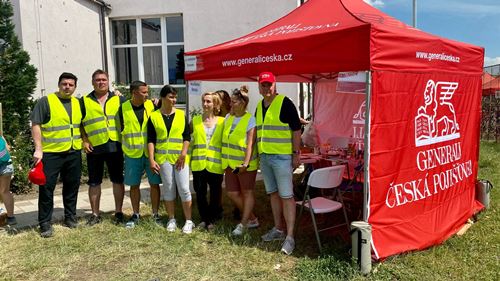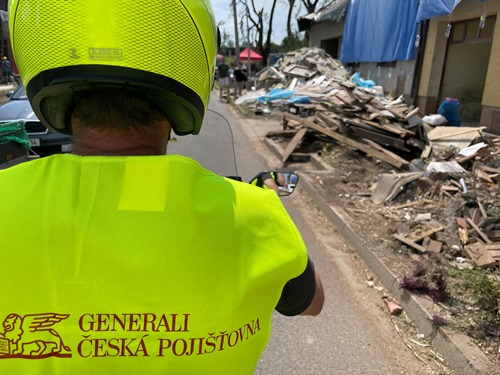“It was like in a war”
10 November 2021
Generali Česká pojišťovna CEO, Roman Juráš, in a special interview with the Czech daily Hospodářské noviny, recalls his experience during the tornado that hit Moravia last summer.

I have never experienced in my entire life such a tragedy, I was shocked by the level of devastation caused by the tornado," recalls Roman Juráš, CEO and Chairman of the Board of Generali Česká pojišťovna. In just 13 minutes an extremely strong storm caused the fourth largest natural catastrophe in our history. The Czech Insurance Association has calculated that financial institutions will have to pay out roughly 5.4 billion crowns, and a third of this amount goes to Generali Česká pojišťovna. Only the previous floods of 1997, 2002 and 2013 were more expensive. According to Juráš, it is possible that similar natural disasters will eventually increase the price of the insurance itself. In any case, this particular one will negatively affect this year financial results of the leading insurance company, which must also calculate losses due to the lame automotive industry.
HN: This year was exceptional for insurance companies due to the June tornado in South Moravia. How do you remember this event?
Very lively because it happened on my birthday. That's why I'll remember it for the rest of my life. On June 24, Generali had an event at the Italian embassy in Prague. From there I moved to Luhačovice on a business trip. When I was somewhere close to Brno I received a video from a colleague, the regional director for South Moravia, capturing the destructive force of the tornado. At first, I didn't know what the video was, but then I understood. It was a shock, because no one expected something like that and didn't even know that it could happen in our country at all. Later that night, a colleague from the claims settlement department set up a coordination group on WhatsApp, and subsequently our crisis staff became operational. The first day after the disaster, on Friday, it was decided how the damages will be fixed quickly and how we should have proceeded to accelerate the payment of the claims. And already on Saturday our colleagues were in the most affected villages, ie in Lužice, Moravská Nová Ves, Mikulčice and Hrušky, and they actively solved the situation with clients.
HN: What happened next?
The priority was to start paying the damages as soon as possible. Over time, however, our stalls also became places where people went for all kinds of help - to charge their mobile phones, drink water, and even cry. I remember a lady coming up to us asking if she could start renovating her house after she took the picture of it. She was shocked. We sent the first money to our clients three days after the tornado raged, and in the more complicated cases, we paid a 50 percent deposit so that people would have the necessary finances at their disposal. But it was not easy for our employees either, because many of them served twelve-hour shifts directly on the spot.
HN: How big was this catastrophe in terms of damages?
 This can be shown in the data of the Czech Insurance Association. It was the fourth worst calamity in the history of the Czech Republic. At the top of this ranking are the floods of 2002, when the total damage was 37 billion crowns. This is followed by the floods in Moravia five years earlier, which caused damage amounting to ten billion, the third is the floods in the Czech Republic in 2013 with 7.5 billion and the fourth this year's tornado with damage of approximately 5.4 billion. These are the numbers for the entire market, not just for our insurance company. This year's event is “exceptional“, because it was a damage in a relatively small area, which occurred in a very short time (13 minutes). Specifically at Generali Česká pojišťovna, we resolve 14,000 claims in the amount of 1.8 billion.. If we add other strong storms and hail, the bill for this year's summer disaster will be about 2.2 billion.
This can be shown in the data of the Czech Insurance Association. It was the fourth worst calamity in the history of the Czech Republic. At the top of this ranking are the floods of 2002, when the total damage was 37 billion crowns. This is followed by the floods in Moravia five years earlier, which caused damage amounting to ten billion, the third is the floods in the Czech Republic in 2013 with 7.5 billion and the fourth this year's tornado with damage of approximately 5.4 billion. These are the numbers for the entire market, not just for our insurance company. This year's event is “exceptional“, because it was a damage in a relatively small area, which occurred in a very short time (13 minutes). Specifically at Generali Česká pojišťovna, we resolve 14,000 claims in the amount of 1.8 billion.. If we add other strong storms and hail, the bill for this year's summer disaster will be about 2.2 billion.
How much of this money remains to be paid out?
At the moment, basically 90 percent of all reported damages are resolved. In principle, large business damages remain to be solved, which are inherently complicated, and thus take longer..
Is there another moment stucked in your memory?
I have never experienced such a tragedy in my entire life, so all the scenes were shocking, it seemed to me like in a war. But I also remember the solidarity that was ubiquitous and visible to our staff, firefighters, police and volunteers who came to help with the damage. Many people actually lost basically everything within a few minutes, they had nowhere to be, often they had nothing to drink and eat, and everyone tried to help them.
How will a similarly costly event be reflected in your financial results this year?
We cannot comment on the results for now, as they are not final. Of course, the mentioned catastrophic events will influence them significantly. However, due to the reinsurance program and our financial strength, we will be able to handle this situation and we will be able to describe the whole year as successful, even though it was very demanding and unpredictable - whether due to the Covid-19 or the tornado. The results will be published after the audit in the spring of 2022. And before that, the Generali Group will have to meet with investors in mid-December, the so-called Investor Day, and present a new strategic and business plan for the next three years.
We're talking about natural disasters. How do climate changes actually affect the way property insurance contracts are negotiated, for example? Do they logically increase the price of these products for your clients?
 The consequences of a tornado certainly represent a significant fluctuation, to which, in my opinion, the market will react. It is possible that the price of reinsurance by foreign reinsurance companies, which act as a kind of insurance policy for insurance companies, will increase. And this will probably have to be reflected in the price of final insurance for clients. So yes, we expect changes in this direction.
The consequences of a tornado certainly represent a significant fluctuation, to which, in my opinion, the market will react. It is possible that the price of reinsurance by foreign reinsurance companies, which act as a kind of insurance policy for insurance companies, will increase. And this will probably have to be reflected in the price of final insurance for clients. So yes, we expect changes in this direction.
Can you say, for example, in percentages, how much will the price increase?
I would not like to estimate this, because negotiations on reinsurance limits and contracts with reinsurance companies are ongoing. In any case, we see in the production of new contracts that the interest in property insurance against these natural disasters is growing very strongly, which has been helped by the experience of people with tornadoes.
Generali Česká pojišťovna is also a major player in the non-life insurance market in the field of car insurance. How will the crisis with the lack of components in this industry, which extremely complicates the production of vehicles, affect the company's business?
The money collected from accident insurance and compulsory liability must logically decrease.
This will show a lot, because of course we are copying market developments in this sector. By delivering fewer cars into circulation, business will dwindle because we will have nothing to insure. On the other hand, the used car market has developed more, which will partially offset the losses. But if Škoda does not produce, we will feel it, because we are one of the largest insurers of new vehicles of this brand in the country. It can be estimated that the market may fall by as much as 20 percent.
Speaking of car insurance. What is the truth about the fact that last year and at the beginning of this year, insurance companies experienced harvests in this area? Is it true that people drove less, the number of accidents decreased and the payment of claims from accident insurance and compulsory insurance decreased significantly?
I certainly wouldn't call it a harvest. Rather, it was a kind of fluctuation at a time when there was a hard lockdown, there was not much to go anywhere, and so the number of insurance claims decreased significantly. However, it was only a matter of a few months, and when the mandatory quarantines ended, the cars began to run again. At that moment, we noticed that the individual indicators returned to the time before Covid-19, and in some weeks and months they even surpassed them - people were afraid to travel by public transport and the number of accidents increased.
Roman Juráš (51)
He graduated from the University of Economics in Bratislava and has been working in the insurance industry for a quarter of a century. Through the Austrian branch of KPMG, he joined the Generali Group and since 1996 has been the head of its "daughter" in Slovakia. He was also in charge of the company within its banking division in Vienna. Since September 2019, he has been the head of Generali Česká pojišťovna. He is a passionate fan of the SSC Napoli football club and also a history enthusiast focusing on the Czechoslovak resistance. Generali Česká pojišťovna's total written premiums reported according to the ČAP methodology in 2020 reached CZK 37.7 billion, of which approximately 73 percent is non-life insurance, in which it is number two on the market after the Austrian group VIG (Kooperativa and Česká podnikatelská pojišťovna). This year, the insurance company in the HN Nejlepší pojišťovna research finished first in the "non-life" category.


